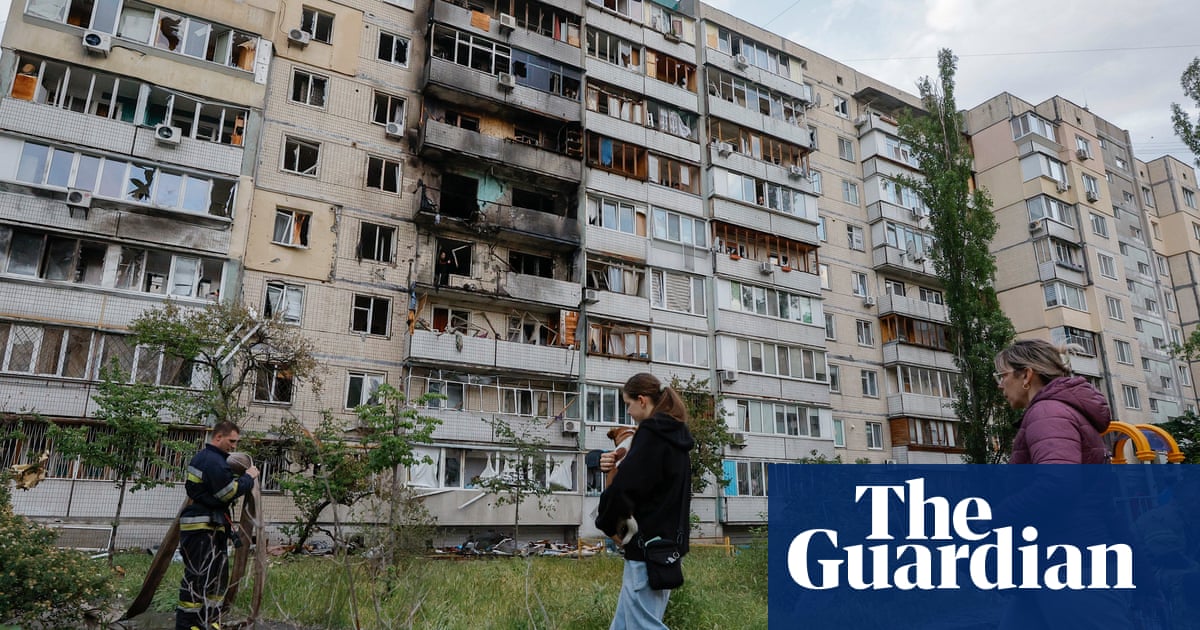Russia has launched a large-scale drone and missile attack on Kyiv, injuring 15 people in one of the biggest assaults on the Ukrainian capital since the beginning of the war more than three years ago.
The attack came in waves, with Russia launching 14 ballistic missiles and 250 drones in the early hours of Saturday, although Ukrainian forces shot down six missiles and stopped most of the drones before they reachedKyiv.
The Ukrainian president,Volodymyr Zelenskyy, said it was a “difficult night for all of Ukraine” and called for more sanctions on Russia in order to achieve a ceasefire.
The attack happened hours after Russia and Ukraine began aprisoner exchange of hundreds of soldiers and civilians, the first phase of a deal agreed in Istanbul this week. The agreement was viewed as a first step towards a permanent ceasefire between the two countries.
The overnight attack prompted people to shelter in Kyiv’s subway stations. Missile debris and unintercepted bombs caused damage in six districts of the city, with plumes of smoke rising from where they landed.
The Obolon district was hit particularly hard, with at least five people being wounded and a residential building heavily damaged, Ukrainian officials said.
The air raid alert in Kyiv lasted more than seven hours as successive waves of drones and missiles were launched towards the capital. The strikes followed several days of Ukrainian drone attacks on Russia, including Moscow, which prompted the Russian foreign minister, Sergei Lavrov, to vow retaliation.
Olha Chyrukha, a 64-year-old resident of Kyiv, standing outside an apartment building damaged in the bombings, said: “I wish they’d agree to a ceasefire. To bomb people like this …”
Other people said their homes had been made uninhabitable by the attacks.
The prisoner swap, in which 1,000 prisoners will be released from each side, was meant to bring Russia andUkrainecloser to achieving a lasting ceasefire deal. Friday’s swap brought 390 Ukrainians back home, with further releases expected over the weekend.
The prospects for progress towards a ceasefire seemed dim, with the Kremlin spokesperson, Dmitry Peskov, saying on Friday that the place for the next round of talks had yet to be chosen.
Lavrov said Moscow would hand Ukraine a draft text stating its conditions for a truce once the prisoner swap had been completed.
Sign up toThis is Europe
The most pressing stories and debates for Europeans – from identity to economics to the environment
after newsletter promotion
International pressure to end the war has been growing in recent months. Donald Trump has made ending the war a key foreign policy aim of his administration. The US president asked Ukraine and Russia to attend renewed talks to achieve a peace deal, a request to which both countries have nominally agreed.
European leaders have accused Moscow of stalling in peace talks while Russian troops try to capture more Ukrainian territory.
After the attack on Kyiv, Zelenskyy accused Russia of seeking to sabotage peace talks, a claim Moscow has also levied at Ukraine.
“With each such attack, the world becomes more certain that the cause of prolonging the war lies in Moscow,” Zelenskyy said in a post on X. “Ukraine has proposed a ceasefire many times … It all has been ignored.”
